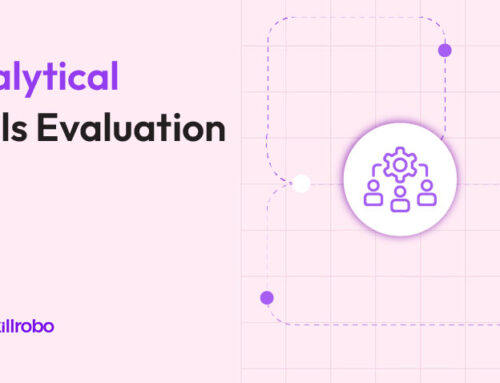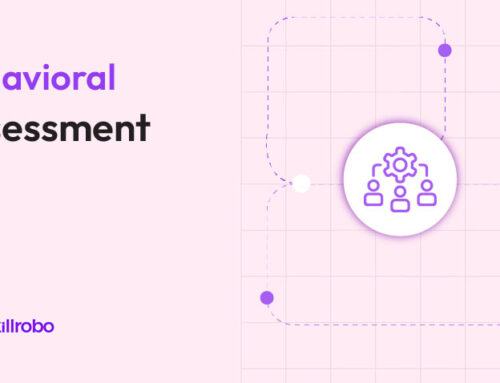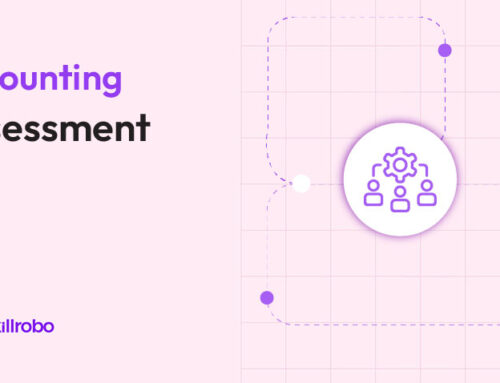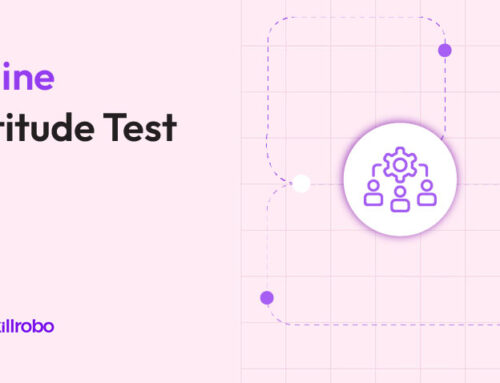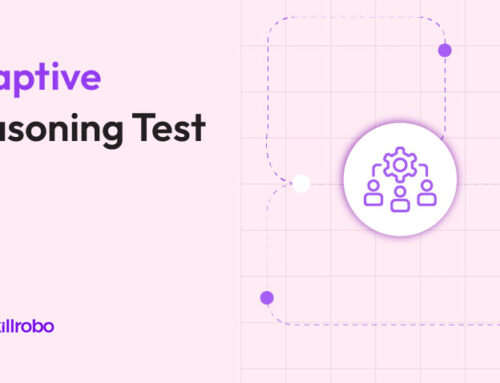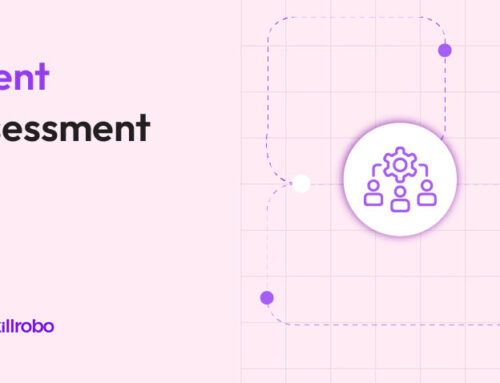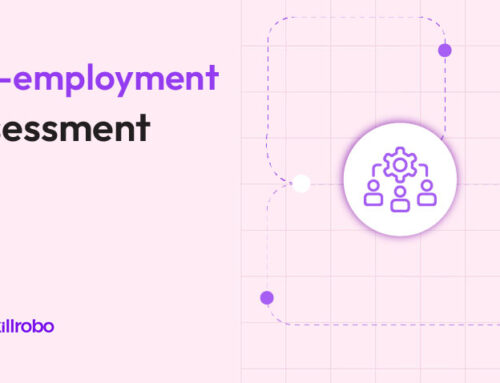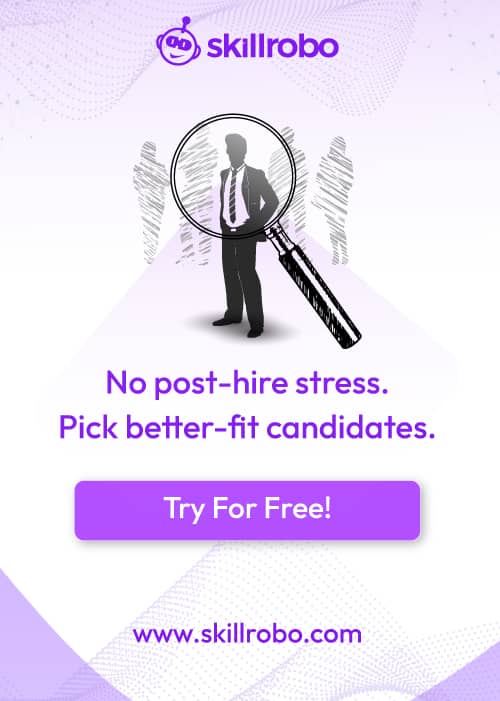Table of Contents
Related articles

What Is an Aptitude Test for a Job?
A job aptitude test is a scientifically designed assessment used to evaluate a candidate’s problem-solving, logical reasoning, and critical thinking abilities. Rather than testing acquired knowledge, aptitude tests focus on natural learning potential, allowing recruiters to assess adaptability, analytical thinking, and how well a candidate can handle real-world job challenges.
Delivered primarily as a job aptitude test online, these assessments cover a range of domains, from numerical reasoning to verbal comprehension, logical analysis, and situational judgment.
Why Recruiters Need Job Aptitude Tests in Hiring
Modern recruitment demands more than just resume reviews and interviews. Resumes may list experience, but they rarely reveal whether a candidate can solve problems, learn quickly, or adapt to changing business needs. The job aptitude test provides recruiters with a highly predictive view of a candidate’s cognitive abilities, reasoning skills, and long-term potential.
Unlike subjective interview impressions, aptitude tests standardize evaluation and help recruiters identify top performers earlier in the hiring process. Whether hiring for entry-level or leadership roles, these assessments provide data-backed confidence that a candidate is equipped to handle role complexity and organizational growth.
What Do Job Assessment Tests Look For?
While every organization tailors aptitude tests to match specific job roles, most assessments focus on evaluating core cognitive and decision-making abilities essential for job performance:
1. Numerical Reasoning
Assesses a candidate’s ability to analyze numerical data, calculate ratios, percentages, and financial metrics, and solve quantitative problems efficiently. This is especially critical in roles such as finance, accounting, analytics, data science, and supply chain management, where quick and accurate numerical decision-making directly impacts business outcomes.
2. Verbal Reasoning
Evaluates reading comprehension, grammar, vocabulary usage, and the ability to logically analyze written information. This skill is highly important for leadership roles, policy interpretation, client communication, report writing, and customer interaction, where strong language processing and clear articulation are required to manage teams, negotiate, or deliver clear reports.
3. Logical Reasoning
Tests a candidate’s pattern recognition, deductive reasoning, and abstract problem-solving abilities. These competencies are particularly valuable for roles in IT development, software engineering, project management, consulting, and corporate strategy, where solving unfamiliar problems and designing structured solutions is central to daily work.
4. Spatial Reasoning
Measures the ability to visualize and mentally manipulate objects in space, including rotations, mirroring, and 3D orientation. This area is crucial for hiring in industries like architecture, manufacturing, mechanical design, civil engineering, and logistics, where spatial awareness directly supports design accuracy, process flow, and operational efficiency.
5. Situational Judgment
Presents real-world job scenarios to assess how candidates approach decision-making, manage interpersonal conflict, demonstrate empathy, and prioritize actions under pressure. These tests are highly predictive for customer service, team leadership, healthcare management, and people management roles where judgment, diplomacy, and relationship handling are critical.
These domains together give recruiters rich, job-relevant data that goes far beyond resumes and interviews, allowing them to make fairer and more predictive hiring decisions across diverse job functions.
Why Job Aptitude Tests Outperform Traditional Screening
Traditional hiring methods often place a heavy weight on resumes, academic credentials, and subjective interviewer impressions. However, these inputs don’t always reflect a candidate’s ability to adapt, problem-solve, or handle the cognitive demands of a specific role. In contrast, job assessment tests offer far more actionable insights:
1. Direct measures of learning potential and cognitive flexibility
Aptitude tests evaluate how quickly candidates process new information, apply reasoning, and solve unfamiliar problems—critical indicators for success in fast-changing business environments.
2. Predictive indicators of long-term job success
Rather than focusing solely on experience, aptitude scores help forecast how candidates will perform and develop over time, improving both initial job fit and future growth potential.
3. Fairer evaluations across diverse candidate backgrounds
By standardizing assessment conditions, aptitude tests reduce bias linked to education pedigree, personal networks, or demographic factors, giving all candidates an equal platform to demonstrate ability.
4. Improved early-stage filtering, reducing unqualified candidates early
Recruiters can efficiently screen out candidates who lack core reasoning capabilities before investing further time in interviews or technical assessments.
5. Higher correlation with on-the-job performance
Multiple studies confirm that aptitude test results often correlate more strongly with job performance than resumes, interviews, or reference checks, particularly for roles requiring critical thinking and learning agility.
By incorporating pre-employment aptitude test solutions into their hiring funnel, recruiters significantly improve both hiring quality and operational efficiency, ensuring that only the strongest candidates move forward.
Benefits of Using Job Aptitude Tests for Recruiters
Adopting job aptitude tests allows recruiters to move from intuition-driven hiring to scientifically backed, scalable selection processes. Some of the most significant recruiter-specific advantages include:
1. Objective Screening
Aptitude tests provide quantifiable data points, removing subjective guesswork from the screening process. Recruiters can compare candidates using standardized scoring models, ensuring that decisions are based on measurable abilities rather than gut feelings or interviewer bias.
2. Bias Reduction
By focusing on core cognitive abilities rather than resumes, educational background, or personal connections, aptitude testing helps level the playing field. This promotes diversity, equity, and inclusion while allowing recruiters to access untapped pools of high-potential talent from varied backgrounds.
3. Shorter Time-to-Hire
With clear scoring benchmarks, aptitude tests quickly identify top performers early in the funnel. This allows recruiters to advance qualified candidates sooner while reducing the time and resources spent reviewing unqualified applications.
4. Higher Retention and Job Fit
Candidates who score well on aptitude tests often demonstrate stronger learning capacity and adaptability, leading to better on-the-job performance, faster ramp-up times, and long-term role satisfaction. This reduces early turnover and strengthens workforce stability.
5. Data-Driven Decision Making
Aptitude test results feed directly into candidate assessment tools, allowing recruiters to easily compare multiple data points—cognitive scores, behavioral assessments, technical skills—and make holistic, evidence-based hiring and promotion decisions. This supports smarter workforce planning and internal mobility as well.
Aptitude Test Questions Examples Recruiters Can Use
Designing effective aptitude tests means selecting job-relevant questions that assess real-world reasoning capabilities. Below are aptitude test questions across core assessment categories that recruiters can leverage to evaluate candidates for diverse roles.
1. Numerical Reasoning
This section evaluates a candidate’s ability to analyze data, interpret numbers, and solve quantitative problems—critical for finance, analytics, operations, and technical roles.
- A company earns $500,000 per quarter. What’s its annual revenue?
Answer: $2,000,000 - If 8 workers complete a project in 10 days, how many days for 4 workers?
Answer: 20 days - A product priced at $250 is discounted by 20%. What is the sale price?
Answer: $200 - A stock price increases by 15% from $40. What’s the new price?
Answer: $46
2. Verbal Reasoning
Assesses language comprehension, grammar, vocabulary, and written logic. Essential for client-facing roles, policy interpretation, leadership, and written communication-heavy positions.
- Choose the synonym for “Ambiguous”:
A) Clear
B) Uncertain
C) Easy
D) Specific
Answer: B) Uncertain - Select the correctly spelled word:
Occurrence / Ocurrence / Occurence
Answer: Occurrence - Fill in the blank:
Despite the delay, the team remained _____ in their efforts.
A) negligent
B) persistent
C) careless
D) indifferent
Answer: B) persistent - Choose the antonym for “Scarce”:
A) Abundant
B) Few
C) Limited
D) Rare
Answer: A) Abundant
3. Logical Reasoning
Tests pattern recognition, deductive reasoning, and problem-solving agility. Often used for IT, analytics, operations, and management roles.
- What comes next: 5, 10, 20, 40, ___
Answer: 80 - Find the odd one out: Apple, Orange, Carrot, Banana
Answer: Carrot - Which figure completes the pattern? (Visual question – typically involving shapes or sequences)
Answer: Dependent on the diagram (pattern-based solution) - Series: 2, 6, 12, 20, ___
A) 28
B) 30
C) 32
D) 34
Answer: A) 30
4. Situational Judgment
Presents realistic work scenarios to evaluate interpersonal skills, decision-making, and emotional intelligence. Common for leadership, customer service, and people management roles.
- A colleague misses multiple deadlines. What is your first action?
Answer: Speak privately to address underlying issues and solutions. - A customer requests a service outside the policy. Your response?
Answer: Explain policy respectfully while offering alternatives. - Two team members argue during a meeting. What do you do?
Answer: Mediate calmly, clarify facts, and realign focus on objectives. - A new team member struggles with a task. Your next step?
Answer: Offer support, clarify instructions, and schedule follow-up training.
How Aptitude Test Software Simplifies Recruitment
Modern aptitude test software provides recruiters with powerful functionality to automate, streamline, and improve every aspect of candidate evaluation. Rather than relying on disjointed spreadsheets or manual processes, recruiters gain end-to-end control over test delivery, scoring, and data integration:
1. Customization
Recruiters can design role-specific assessments tailored to the competencies required for each job, department, or leadership tier. This ensures that test content directly mirrors real-world job demands, improving relevance and predictive accuracy.
2. Real-Time Reporting
Instant scoring allows hiring managers to access candidate performance metrics immediately after test completion. Built-in analytics enable recruiters to set clear pass/fail thresholds, rank candidates against benchmarks, and advance only top performers.
3. Remote Proctoring
With browser lockdown, webcam tracking, and AI-based cheating detection, recruiters can administer secure online assessments while preserving the integrity of results, especially important for high-volume or remote hiring pipelines.
4. ATS Integration
Seamless connectivity with Applicant Tracking Systems allows recruiters to automate the test invitation process, sync results directly to candidate profiles, and maintain complete transparency throughout the hiring journey.
5. Compliance
Leading platforms incorporate GDPR, EEOC, and accessibility standards automatically, ensuring all tests are conducted ethically, securely, and with full legal compliance across global locations.
In addition, modern aptitude test platforms integrate with broader employee assessment software, allowing HR teams to unify candidate data with post-hire performance, training, and career development metrics for ongoing workforce optimization.
How Job Aptitude Tests Fit Across the Hiring Funnel
Job aptitude tests are flexible tools that support multiple stages of the hiring funnel, delivering value from early screening through long-term workforce development:
1. Pre-Screening
Recruiters can administer aptitude assessments early in the funnel to automatically filter large applicant pools. Candidates who demonstrate strong reasoning capabilities advance quickly, while unqualified applicants are filtered out, reducing time wasted on weak profiles.
2. Shortlisting
Aptitude test scores serve as an objective foundation that complements interviews, job simulations, and behavioral assessments. This multi-dimensional approach gives recruiters stronger data to evaluate both technical fit and culture alignment before final interviews.
3. Pre-Employment Assessment Tests
When paired with broader pre-employment assessment tests, aptitude testing allows recruiters to evaluate both cognitive skills and job-specific technical competencies. This holistic approach strengthens predictions of job readiness, adaptability, and growth potential.
4. Internal Mobility
Aptitude test data feeds directly into employee talent assessment programs, helping identify high-potential employees ready for promotions, cross-functional roles, or leadership development pathways.
5. Talent Development
Test results support talent development assessment strategies by identifying individualized training needs. HR teams can use aptitude insights to guide upskilling, reskilling, and long-term career development plans that align with organizational growth.
Industry-Specific Use Cases for Recruiters
While aptitude testing follows universal cognitive principles, its true power lies in how assessments are customized for different industries. Recruiters across sectors can design job aptitude tests that reflect the real-world reasoning, problem-solving, and decision-making demands specific to each role. By aligning test content with job functions, recruiters improve predictive accuracy and ensure candidates possess the core capabilities required for success.
1. Finance & Banking
Numerical reasoning tests are essential for roles in investment analysis, risk management, forecasting, and financial reporting. Candidates must demonstrate strong quantitative aptitude to handle data-driven decision-making under pressure.
2. Technology
Logical reasoning assessments evaluate how software developers, systems architects, and IT analysts approach complex problem-solving. Strong pattern recognition and cognitive agility directly correlate with technical troubleshooting and innovation.
3. Healthcare Administration
Verbal reasoning tests help assess candidates for roles requiring policy interpretation, documentation accuracy, and compliance adherence, critical for healthcare operations, billing, insurance, and medical administration roles.
4. Customer Service & Sales
Situational judgment tests measure candidates’ empathy, conflict resolution, communication skills, and decision-making abilities. High scorers demonstrate stronger client engagement, problem-solving, and customer satisfaction capabilities.
5. Engineering & Manufacturing
Spatial reasoning assessments allow recruiters to evaluate candidates’ ability to mentally visualize components, read technical drawings, and troubleshoot process flows. This is vital for mechanical design, CAD roles, production planning, and quality control.
Integrating Skill Mapping Tools for Holistic Workforce Planning
Beyond hiring, many organizations now integrate skill mapping tools with aptitude testing to track workforce capabilities in real-time. These tools visualize skill gaps, align training investments, and inform workforce planning based on evolving job demands. Skill mapping also supports cross-functional mobility by matching employees to internal roles based on cognitive strengths and future potential.
By combining aptitude data with skill mapping tools, recruiters and HR leaders gain a dynamic, data-driven view of organizational talent. This enables more proactive decisions around reskilling, succession planning, and internal promotions. Instead of relying on static job descriptions, companies can continuously align workforce capabilities with business strategy, ensuring both current performance and long-term agility.
How Skillrobo Supports Aptitude Testing for Recruiters
Skillrobo offers an AI-powered, no-code platform that helps recruiters build fully customized job aptitude test online solutions. With adaptive question generation, real-time analytics, role-based assessments, and full integration with ATS and HRIS systems, Skillrobo empowers recruiters to streamline both external hiring and internal talent mobility. The platform ensures data privacy, compliance, and predictive hiring outcomes for companies of all sizes.
Additionally, Skillrobo allows:
- Rapid test deployment: Create and launch role-specific assessments in minutes without technical expertise.
- Built-in anti-cheating measures: Secure browser lockdown, webcam proctoring, and behavioral monitoring ensure test integrity.
- Unified talent data: Merge aptitude test results with behavioral, technical, and skill mapping data for 360-degree candidate profiles.
- Continuous workforce development: Use post-hire testing to guide reskilling, leadership development, and succession planning.
Smarter Hiring Begins with Aptitude Testing
The job aptitude test provides recruiters with the objective data needed to improve hiring accuracy, reduce bias, and strengthen workforce agility. By combining aptitude assessments with pre-employment tests, AI talent assessment, and integrated employee assessment software, organizations make smarter, faster, and more inclusive hiring decisions.
Sign up for Skillrobo today to elevate your hiring strategy with powerful aptitude testing solutions built for modern recruiters.
Frequently Asked Questions
1. What is a job aptitude test used for?
It measures reasoning, learning agility, and problem-solving to predict future job performance.
2. How do aptitude tests improve hiring quality?
They provide objective data, reduce bias, and identify high-potential candidates early in the hiring funnel.
3. Are aptitude tests only for entry-level roles?
No, they’re valuable at all levels, including management, leadership, and technical positions.
4. Can aptitude tests predict leadership potential?
Yes. Paired with behavioral assessments, aptitude tests reveal decision-making and strategic thinking abilities.
5. Is aptitude testing fair?
When validated and properly administered, aptitude tests promote fairness by evaluating cognitive ability rather than background.

What Is an Aptitude Test for a Job?
A job aptitude test is a scientifically designed assessment used to evaluate a candidate’s problem-solving, logical reasoning, and critical thinking abilities. Rather than testing acquired knowledge, aptitude tests focus on natural learning potential, allowing recruiters to assess adaptability, analytical thinking, and how well a candidate can handle real-world job challenges.
Delivered primarily as a job aptitude test online, these assessments cover a range of domains, from numerical reasoning to verbal comprehension, logical analysis, and situational judgment.
Why Recruiters Need Job Aptitude Tests in Hiring
Modern recruitment demands more than just resume reviews and interviews. Resumes may list experience, but they rarely reveal whether a candidate can solve problems, learn quickly, or adapt to changing business needs. The job aptitude test provides recruiters with a highly predictive view of a candidate’s cognitive abilities, reasoning skills, and long-term potential.
Unlike subjective interview impressions, aptitude tests standardize evaluation and help recruiters identify top performers earlier in the hiring process. Whether hiring for entry-level or leadership roles, these assessments provide data-backed confidence that a candidate is equipped to handle role complexity and organizational growth.
What Do Job Assessment Tests Look For?
While every organization tailors aptitude tests to match specific job roles, most assessments focus on evaluating core cognitive and decision-making abilities essential for job performance:
1. Numerical Reasoning
Assesses a candidate’s ability to analyze numerical data, calculate ratios, percentages, and financial metrics, and solve quantitative problems efficiently. This is especially critical in roles such as finance, accounting, analytics, data science, and supply chain management, where quick and accurate numerical decision-making directly impacts business outcomes.
2. Verbal Reasoning
Evaluates reading comprehension, grammar, vocabulary usage, and the ability to logically analyze written information. This skill is highly important for leadership roles, policy interpretation, client communication, report writing, and customer interaction, where strong language processing and clear articulation are required to manage teams, negotiate, or deliver clear reports.
3. Logical Reasoning
Tests a candidate’s pattern recognition, deductive reasoning, and abstract problem-solving abilities. These competencies are particularly valuable for roles in IT development, software engineering, project management, consulting, and corporate strategy, where solving unfamiliar problems and designing structured solutions is central to daily work.
4. Spatial Reasoning
Measures the ability to visualize and mentally manipulate objects in space, including rotations, mirroring, and 3D orientation. This area is crucial for hiring in industries like architecture, manufacturing, mechanical design, civil engineering, and logistics, where spatial awareness directly supports design accuracy, process flow, and operational efficiency.
5. Situational Judgment
Presents real-world job scenarios to assess how candidates approach decision-making, manage interpersonal conflict, demonstrate empathy, and prioritize actions under pressure. These tests are highly predictive for customer service, team leadership, healthcare management, and people management roles where judgment, diplomacy, and relationship handling are critical.
These domains together give recruiters rich, job-relevant data that goes far beyond resumes and interviews, allowing them to make fairer and more predictive hiring decisions across diverse job functions.
Why Job Aptitude Tests Outperform Traditional Screening
Traditional hiring methods often place a heavy weight on resumes, academic credentials, and subjective interviewer impressions. However, these inputs don’t always reflect a candidate’s ability to adapt, problem-solve, or handle the cognitive demands of a specific role. In contrast, job assessment tests offer far more actionable insights:
1. Direct measures of learning potential and cognitive flexibility
Aptitude tests evaluate how quickly candidates process new information, apply reasoning, and solve unfamiliar problems—critical indicators for success in fast-changing business environments.
2. Predictive indicators of long-term job success
Rather than focusing solely on experience, aptitude scores help forecast how candidates will perform and develop over time, improving both initial job fit and future growth potential.
3. Fairer evaluations across diverse candidate backgrounds
By standardizing assessment conditions, aptitude tests reduce bias linked to education pedigree, personal networks, or demographic factors, giving all candidates an equal platform to demonstrate ability.
4. Improved early-stage filtering, reducing unqualified candidates early
Recruiters can efficiently screen out candidates who lack core reasoning capabilities before investing further time in interviews or technical assessments.
5. Higher correlation with on-the-job performance
Multiple studies confirm that aptitude test results often correlate more strongly with job performance than resumes, interviews, or reference checks, particularly for roles requiring critical thinking and learning agility.
By incorporating pre-employment aptitude test solutions into their hiring funnel, recruiters significantly improve both hiring quality and operational efficiency, ensuring that only the strongest candidates move forward.
Benefits of Using Job Aptitude Tests for Recruiters
Adopting job aptitude tests allows recruiters to move from intuition-driven hiring to scientifically backed, scalable selection processes. Some of the most significant recruiter-specific advantages include:
1. Objective Screening
Aptitude tests provide quantifiable data points, removing subjective guesswork from the screening process. Recruiters can compare candidates using standardized scoring models, ensuring that decisions are based on measurable abilities rather than gut feelings or interviewer bias.
2. Bias Reduction
By focusing on core cognitive abilities rather than resumes, educational background, or personal connections, aptitude testing helps level the playing field. This promotes diversity, equity, and inclusion while allowing recruiters to access untapped pools of high-potential talent from varied backgrounds.
3. Shorter Time-to-Hire
With clear scoring benchmarks, aptitude tests quickly identify top performers early in the funnel. This allows recruiters to advance qualified candidates sooner while reducing the time and resources spent reviewing unqualified applications.
4. Higher Retention and Job Fit
Candidates who score well on aptitude tests often demonstrate stronger learning capacity and adaptability, leading to better on-the-job performance, faster ramp-up times, and long-term role satisfaction. This reduces early turnover and strengthens workforce stability.
5. Data-Driven Decision Making
Aptitude test results feed directly into candidate assessment tools, allowing recruiters to easily compare multiple data points—cognitive scores, behavioral assessments, technical skills—and make holistic, evidence-based hiring and promotion decisions. This supports smarter workforce planning and internal mobility as well.
Aptitude Test Questions Examples Recruiters Can Use
Designing effective aptitude tests means selecting job-relevant questions that assess real-world reasoning capabilities. Below are aptitude test questions across core assessment categories that recruiters can leverage to evaluate candidates for diverse roles.
1. Numerical Reasoning
This section evaluates a candidate’s ability to analyze data, interpret numbers, and solve quantitative problems—critical for finance, analytics, operations, and technical roles.
- A company earns $500,000 per quarter. What’s its annual revenue?
Answer: $2,000,000 - If 8 workers complete a project in 10 days, how many days for 4 workers?
Answer: 20 days - A product priced at $250 is discounted by 20%. What is the sale price?
Answer: $200 - A stock price increases by 15% from $40. What’s the new price?
Answer: $46
2. Verbal Reasoning
Assesses language comprehension, grammar, vocabulary, and written logic. Essential for client-facing roles, policy interpretation, leadership, and written communication-heavy positions.
- Choose the synonym for “Ambiguous”:
A) Clear
B) Uncertain
C) Easy
D) Specific
Answer: B) Uncertain - Select the correctly spelled word:
Occurrence / Ocurrence / Occurence
Answer: Occurrence - Fill in the blank:
Despite the delay, the team remained _____ in their efforts.
A) negligent
B) persistent
C) careless
D) indifferent
Answer: B) persistent - Choose the antonym for “Scarce”:
A) Abundant
B) Few
C) Limited
D) Rare
Answer: A) Abundant
3. Logical Reasoning
Tests pattern recognition, deductive reasoning, and problem-solving agility. Often used for IT, analytics, operations, and management roles.
- What comes next: 5, 10, 20, 40, ___
Answer: 80 - Find the odd one out: Apple, Orange, Carrot, Banana
Answer: Carrot - Which figure completes the pattern? (Visual question – typically involving shapes or sequences)
Answer: Dependent on the diagram (pattern-based solution) - Series: 2, 6, 12, 20, ___
A) 28
B) 30
C) 32
D) 34
Answer: A) 30
4. Situational Judgment
Presents realistic work scenarios to evaluate interpersonal skills, decision-making, and emotional intelligence. Common for leadership, customer service, and people management roles.
- A colleague misses multiple deadlines. What is your first action?
Answer: Speak privately to address underlying issues and solutions. - A customer requests a service outside the policy. Your response?
Answer: Explain policy respectfully while offering alternatives. - Two team members argue during a meeting. What do you do?
Answer: Mediate calmly, clarify facts, and realign focus on objectives. - A new team member struggles with a task. Your next step?
Answer: Offer support, clarify instructions, and schedule follow-up training.
How Aptitude Test Software Simplifies Recruitment
Modern aptitude test software provides recruiters with powerful functionality to automate, streamline, and improve every aspect of candidate evaluation. Rather than relying on disjointed spreadsheets or manual processes, recruiters gain end-to-end control over test delivery, scoring, and data integration:
1. Customization
Recruiters can design role-specific assessments tailored to the competencies required for each job, department, or leadership tier. This ensures that test content directly mirrors real-world job demands, improving relevance and predictive accuracy.
2. Real-Time Reporting
Instant scoring allows hiring managers to access candidate performance metrics immediately after test completion. Built-in analytics enable recruiters to set clear pass/fail thresholds, rank candidates against benchmarks, and advance only top performers.
3. Remote Proctoring
With browser lockdown, webcam tracking, and AI-based cheating detection, recruiters can administer secure online assessments while preserving the integrity of results, especially important for high-volume or remote hiring pipelines.
4. ATS Integration
Seamless connectivity with Applicant Tracking Systems allows recruiters to automate the test invitation process, sync results directly to candidate profiles, and maintain complete transparency throughout the hiring journey.
5. Compliance
Leading platforms incorporate GDPR, EEOC, and accessibility standards automatically, ensuring all tests are conducted ethically, securely, and with full legal compliance across global locations.
In addition, modern aptitude test platforms integrate with broader employee assessment software, allowing HR teams to unify candidate data with post-hire performance, training, and career development metrics for ongoing workforce optimization.
How Job Aptitude Tests Fit Across the Hiring Funnel
Job aptitude tests are flexible tools that support multiple stages of the hiring funnel, delivering value from early screening through long-term workforce development:
1. Pre-Screening
Recruiters can administer aptitude assessments early in the funnel to automatically filter large applicant pools. Candidates who demonstrate strong reasoning capabilities advance quickly, while unqualified applicants are filtered out, reducing time wasted on weak profiles.
2. Shortlisting
Aptitude test scores serve as an objective foundation that complements interviews, job simulations, and behavioral assessments. This multi-dimensional approach gives recruiters stronger data to evaluate both technical fit and culture alignment before final interviews.
3. Pre-Employment Assessment Tests
When paired with broader pre-employment assessment tests, aptitude testing allows recruiters to evaluate both cognitive skills and job-specific technical competencies. This holistic approach strengthens predictions of job readiness, adaptability, and growth potential.
4. Internal Mobility
Aptitude test data feeds directly into employee talent assessment programs, helping identify high-potential employees ready for promotions, cross-functional roles, or leadership development pathways.
5. Talent Development
Test results support talent development assessment strategies by identifying individualized training needs. HR teams can use aptitude insights to guide upskilling, reskilling, and long-term career development plans that align with organizational growth.
Industry-Specific Use Cases for Recruiters
While aptitude testing follows universal cognitive principles, its true power lies in how assessments are customized for different industries. Recruiters across sectors can design job aptitude tests that reflect the real-world reasoning, problem-solving, and decision-making demands specific to each role. By aligning test content with job functions, recruiters improve predictive accuracy and ensure candidates possess the core capabilities required for success.
1. Finance & Banking
Numerical reasoning tests are essential for roles in investment analysis, risk management, forecasting, and financial reporting. Candidates must demonstrate strong quantitative aptitude to handle data-driven decision-making under pressure.
2. Technology
Logical reasoning assessments evaluate how software developers, systems architects, and IT analysts approach complex problem-solving. Strong pattern recognition and cognitive agility directly correlate with technical troubleshooting and innovation.
3. Healthcare Administration
Verbal reasoning tests help assess candidates for roles requiring policy interpretation, documentation accuracy, and compliance adherence, critical for healthcare operations, billing, insurance, and medical administration roles.
4. Customer Service & Sales
Situational judgment tests measure candidates’ empathy, conflict resolution, communication skills, and decision-making abilities. High scorers demonstrate stronger client engagement, problem-solving, and customer satisfaction capabilities.
5. Engineering & Manufacturing
Spatial reasoning assessments allow recruiters to evaluate candidates’ ability to mentally visualize components, read technical drawings, and troubleshoot process flows. This is vital for mechanical design, CAD roles, production planning, and quality control.
Integrating Skill Mapping Tools for Holistic Workforce Planning
Beyond hiring, many organizations now integrate skill mapping tools with aptitude testing to track workforce capabilities in real-time. These tools visualize skill gaps, align training investments, and inform workforce planning based on evolving job demands. Skill mapping also supports cross-functional mobility by matching employees to internal roles based on cognitive strengths and future potential.
By combining aptitude data with skill mapping tools, recruiters and HR leaders gain a dynamic, data-driven view of organizational talent. This enables more proactive decisions around reskilling, succession planning, and internal promotions. Instead of relying on static job descriptions, companies can continuously align workforce capabilities with business strategy, ensuring both current performance and long-term agility.
How Skillrobo Supports Aptitude Testing for Recruiters
Skillrobo offers an AI-powered, no-code platform that helps recruiters build fully customized job aptitude test online solutions. With adaptive question generation, real-time analytics, role-based assessments, and full integration with ATS and HRIS systems, Skillrobo empowers recruiters to streamline both external hiring and internal talent mobility. The platform ensures data privacy, compliance, and predictive hiring outcomes for companies of all sizes.
Additionally, Skillrobo allows:
- Rapid test deployment: Create and launch role-specific assessments in minutes without technical expertise.
- Built-in anti-cheating measures: Secure browser lockdown, webcam proctoring, and behavioral monitoring ensure test integrity.
- Unified talent data: Merge aptitude test results with behavioral, technical, and skill mapping data for 360-degree candidate profiles.
- Continuous workforce development: Use post-hire testing to guide reskilling, leadership development, and succession planning.
Smarter Hiring Begins with Aptitude Testing
The job aptitude test provides recruiters with the objective data needed to improve hiring accuracy, reduce bias, and strengthen workforce agility. By combining aptitude assessments with pre-employment tests, AI talent assessment, and integrated employee assessment software, organizations make smarter, faster, and more inclusive hiring decisions.
Sign up for Skillrobo today to elevate your hiring strategy with powerful aptitude testing solutions built for modern recruiters.
Frequently Asked Questions
1. What is a job aptitude test used for?
It measures reasoning, learning agility, and problem-solving to predict future job performance.
2. How do aptitude tests improve hiring quality?
They provide objective data, reduce bias, and identify high-potential candidates early in the hiring funnel.
3. Are aptitude tests only for entry-level roles?
No, they’re valuable at all levels, including management, leadership, and technical positions.
4. Can aptitude tests predict leadership potential?
Yes. Paired with behavioral assessments, aptitude tests reveal decision-making and strategic thinking abilities.
5. Is aptitude testing fair?
When validated and properly administered, aptitude tests promote fairness by evaluating cognitive ability rather than background.



